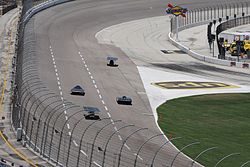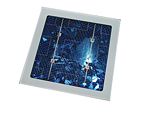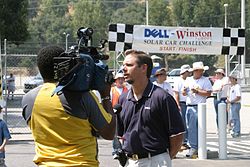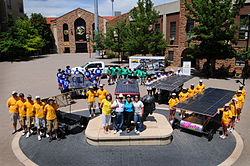- The Solar Car Challenge
-
Solar Car Challenge Established 1993 Location United States Website www.solarcarchallenge/challenge [1] The Solar Car Challenge is an annual solar-powered car race for high school students.The event attracts teams from around the world, but mostly from American high schools. The race was first held in 1995. Each event is the end product of a two year education cycle launched by the Winston Solar Car Team. On odd-numbered years, the race is a road course that starts at the Texas Motor Speedway, Fort Worth, Texas; the end of the course varies from year to year. On even-numbered years, the race is a track race around the Texas Motor Speedway. Dell sponsored the event from 2002-2008. Hunt Oil Company sponsored the 2010 race.
History of the Race
In 1993, the Solar Car Team launched an education program to teach high school students how to build and safely race roadworthy solar cars. The Solar Education Program met this objective, and worked to provide curriculum materials, on-site visits, and workshop opportunities for high schools across the country. This program was designed to motivate students in the sciences, engineering, and technology. The end product of each two-year education cycle is the Solar Car Challenge: a closed-track event at the world famous Texas Motor Speedway, or a cross country race designed to give students an opportunity to display their work.
Goal of The Solar Challenge
The Solar Car Challenge is designed to help motivate students in science, engineering, technology, and alternative energy. The Solar Car Challenge Education Program teaches high school students how to design, engineer, build, and safely race a roadworthy solar car.
Race Objective
Teams experience the fun of the Solar Car Challenge at the world famous Texas Motor Speedway. Car breakdowns, weather, and team experience limit the number of laps a team can drive each day. The team driving the most laps accumulated over the four days of racing will be declared the winner.
Solar Car Categories
The purpose of the Solar Car Challenge is to provide a level playing-field for high school solar car teams. Newer teams generally enter the Classic Division which requires participants to use less expensive conventional motors, lead acid batteries, and less efficient solar cells. Older teams enter the Open Division based on their use of more expensive technology. The new Advanced Division allows teams to use university body molds and more exotic batteries.
Admission into the Race
Teams seeking admission to the event must register their vehicle and demonstrate that their solar car complies with all the rules during a qualifying process known as “Scrutineering.” In cross-country races, teams are licensed in Texas as experimental vehicles, and carry liability insurance.
Safety & Supervision
Each car must have a roll cage, “crush zones,” safety harness, horn, communications, turn signals, and a fire extinguisher. Chase vehicles and trailers are available for support in the event of a breakdown on the track. All aspects of the Solar Car Challenge Rules are closely monitored. A wireless computer network helps race officials closely monitor the individual cars.
Media coverage
- The Solar Car Challenge was named one of America's 10 most innovative education programs by Business Wire in 2003
- The 2008 Solar Car Challenge's Promo Video can be seen here.
Cross-Country
Past races have traveled from Round Rock, which is Dell Computers Headquarters to California, Florida, New York, and Indiana. These races usually take place on odd-numbered years, and takes place at the Texas Motor Speedway on even-numbered years.
Closed Track
 Closed track at the Texas Motor Speedway
Closed track at the Texas Motor Speedway
Closes Track are which take place at the Texas Motor Speedway usually take place on the odd-numbered years. These races normally go on for a week, while the Cross-Country take two to three weeks.
Intern Program
Former solar car team members are invited to help run the event in the Intern Program. Interns have come from teams from all over the USA and Mexico. Interns work alongside judges to help with scrutineering, judge teams during the event, and act as spotters during closed.
The Solar Car Challenge Education Program
The Solar Car Challenge is the product of the Solar Education Program. The Solar Car Challenge Foundation provides an international high school solar education program. Workshops, curriculum materials, DVD’s, and on site visits have introduced this challenge to more than 1100 schools in 20 countries. The Solar Car Challenge Foundation is recognized by the IRS as a 501(c)(3) non-profit educational organization.
Previous and Upcoming Challenges
Cross-country events have traditionally started in Texas (generally either Dallas or Round Rock) and ended in a number of different locations across the USA.
- 1995: Dallas County, Texas
The 1995 race was a 70-mile circuit of Dallas County repeated over 3 days. The team completing the race in the shortest period of time was declared the winner. The winner, Los Altos (Hacienda Heights, California)
- 1996: No Race
- 1997: Dallas, TX to San Antonio, TX
1997 Race Rules calculate the winner by the highest average speed. Winner, Solar Shadow, Los Altos School, Hacienda Heights, California
- 1998: Texas Motor Speedway
3 Day Track Race, Winner: Project RayC4 Knowledge (Solar Stealth), C4 Technology Program, Columbus, IN with a total of 390.3 miles 1999: Dallas, TX to Los Angeles, CA 7 Day Cross-Country Race: Winner; Solar Stealth, C4 Technology Program, Columbus, IN with a total of 595 miles
- 2000: Texas Motor Speedway
3 Day Track Race, Winner: NFA Solar Racing Team, Newburgh High School, Newburgh, NY with a total of 381 miles
- 2001: Round Rock, TX to Columbus, IN
8 Day Cross-Country Race: Winner; Sundancer II, Houston High School, Houston , MS with 795.1 miles (average speed was 29.6 mph)
- 2002: Texas Motor Speedway
3 Day Track Race, Winner of the Classic Division: The Winston Solar Car Team with 252 miles, Winner of the Open Division: Sundancer II, Houston High School, Houston , MS with 361.5 miles.
- 2003: Round Rock, TX to Cocoa Beach, FL*
9 Day Cross-Country Race: Overall Winner; Sundancer II, Houston High School, Houston , MS with 689.2 miles
- 2004: Texas Motor Speedway
4 Day Track Race, Winner of the Classic Division: The Winston Solar Car Team with 417 miles, WInner of the Open Division: Sundancer II, Houston High School, Houston , MS with 576 miles.
- 2005: Round Rock, TX to Los Angeles, CA*
8 Day Cross-Country Race: Winner of the Classic Division: Saint Thomas Academy Experimental Vehicle Team, Saint Thomas Academy, Mendota Heights, MN with 959.8 miles (average speed was 26.09 mph), Winner of the Open Division wasSundancer II, Houston High School, Houston , MS with a total of 853.4 miles (average speed was 28.63 mph)
- 2006: Texas Motor Speedway
4 Day Track Race, Winner of the Classic Division was Saint Thomas Academy Experimental Vehicle Team, Saint Thomas Academy, Mendota Heights, MN with 598.5 miles, Winner of the Open Division was Sundancer II, Houston High School, Houston , MS with 624 miles.
- 2007: Round Rock, TX to Newburgh, NY
Winner of the Classic Division was Newton County Solar Car Team, Newton County Career & Technical Center Decatur, MS (average speed was 17.05 mph), Winner of the Open Division ended with a tie, Sundancer II, Houston High School, Houston , MS (average speed was 38.76 mph) and NFA Solar Racing Team, Newburgh High School, Newburgh, NY (average speed was 38.42 mph) For the 2007 race a tie was declared because both teams finished completed the course (689.1 mi) and had total running time was within 1%
- 2008: Texas Motor Speedway*
4 Day Track Race, Winner of the Classic Division was Sundacer I, Houston High School, Houston MS with 495 miles, Winner of the Open Division was Sundancer II, Houston High School, Houston , MS with 657 miles.
- 2009: Texas Motor Speedway
4 Day Track Race, Winner of the Classic Division was Solar Knight II, South Plantation High School, Plantation, FL with 592 miles. Winner of the Open Division was Sundancer II, Houston High School, Houston, MS with 831 miles.
- 2010: Fort Worth, TX to Boulder, CL
7 Day Cross-Country Race: Winner of the Classic Division was Sundancer II, Houston High School, Houston, MS with 685 miles. Winner of the Open Division was Sundancer I, Houston High School,
- 2011
Closed Track Race that will take place July 18th-21st
See also
- Solar car racing
- World Solar Car Challenge
- The Quiet Achiever, the world's first solar-powered racecar
External links
References
- ^ "About the Solar Car Challenge". Solar Car Challenge (official website). http://www.winstonsolar.org/challenge/about.shtml. Retrieved 2007-08-06.
- ^ Tracy Watler (reporter) (July 18, 2007) (Flash). Racing on solar power (television report). KLTV/CNN. http://www.cnn.com/video/#/video/tech/2007/07/18/watler.solar.powered.cars.kltv.
- ^ (Flash) Racing on solar power. July 18, 2006. http://www.youtube.com/watch?v=-C-bi5iDdu8.
Photovoltaics Concepts - Photoelectric effect
- Photovoltaics
- History of photovoltaics
- Timeline of solar cells
- Solar insolation
- Solar constant
- Solar cell efficiency
- Third generation photovoltaic cell
- Solar cell research
- Quantum efficiency of a solar cell
- Cadmium telluride
- Thermophotovoltaic
- Polycrystalline silicon photovoltaics
- Thermodynamic efficiency limit
- Sun-free photovoltaics
- Polarizing organic photovoltaics

Photovoltaic system Solar cells- Solar cell
- Solar panel
- Thin film solar cell
- Polymer solar cell
- Nanocrystal solar cell
- Organic solar cell
- Quantum dot solar cell
- Hybrid solar cell
- Plasmonic solar cell
- Carbon nanotubes in photovoltaics
- Dye-sensitized solar cell
- Cadmium telluride photovoltaics
- Copper indium gallium selenide solar cells
- Multijunction photovoltaic cell
- Printed solar panel
System components- Solar charge controller
- Solar inverter
- Solar micro-inverter
- Solar cable
- Solar combiner box
- Photovoltaic mounting system
- Maximum power point tracker
- Solar tracker
- Solar shingles
- Solar mirror
System concepts- Perturb and observe method
- Incremental conductance method
- Constant voltage method
- Fill factor
- Concentrated photovoltaics
- Photovoltaic thermal hybrid solar collector
- Space-based solar power
- Watt-peak
Applications Appliances- Solar-powered refrigerator
- Solar air conditioning
- Solar lamp
- Solar charger
- Solar backpack
- Solar tree
- Solar-powered pump
- Solar-powered watch
- Solar Tuki
- Photovoltaic keyboard
- Solar road stud
- Solar cell phone charger
- Solar notebook
- Solar powered calculator
- Solar powered fountain
- Solar powered radio
- Solar powered flashlight
- Solar fan
- Solar street light
- Solar traffic light
Land transport- Solar vehicle
- Solar car
- Solar roadway
- Solar golf cart
- The Quiet Achiever
- Sunmobile
Air transport- Electric aircraft
- Mauro Solar Riser
- Solar panels on spacecraft
- Solar-Powered Aircraft Developments Solar One
- Gossamer Penguin
- Qinetiq Zephyr
- Solar Challenger
Water transportSolar vehicle racing- Solar car racing
- List of solar car teams
- Solar challenge
- Solar Cup
- Blue Sky Solar Racing
- Frisian Solar Challenge
- UC Solar Team
- Solar Splash
- South African Solar Challenge
- Tour de Sol
- World Solar Challenge
- Hunt-Winston School Solar Car Challenge
- North American Solar Challenge
- Victorian Model Solar Vehicle Challenge
Generation systems - Solar Energy Generating Systems
- Stand-alone photovoltaic power system
- Grid-connected photovoltaic power system
- Rooftop photovoltaic power station
- Topaz Solar Farm
- Solar Ark
- Solar Umbrella house
- Erlasee Solar Park
- Guadarranque solar power plant
- Pocking Solar Park
- Copper Mountain Solar Facility
- Wyandot Solar Facility
- Köthen Solar Park
- Building-integrated photovoltaics
- Moura Photovoltaic Power Station
- Nevada Solar One
- Beneixama photovoltaic power plant
- Gottelborn Solar Park
- Darro Solar Park
- Olmedilla Photovoltaic Park
- Blythe Photovoltaic Power Plant
- Strasskirchen Solar Park
- Puertollano Photovoltaic Park
- Alamosa photovoltaic power plant
By countryList of countries by photovoltaics productionPV companies Categories:- Solar car races
- Photovoltaics
Wikimedia Foundation. 2010.



